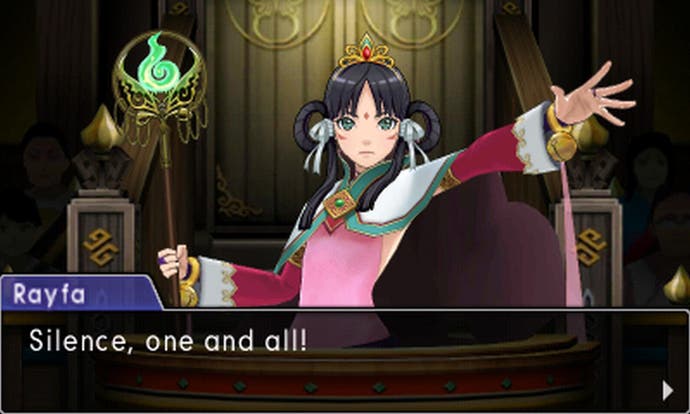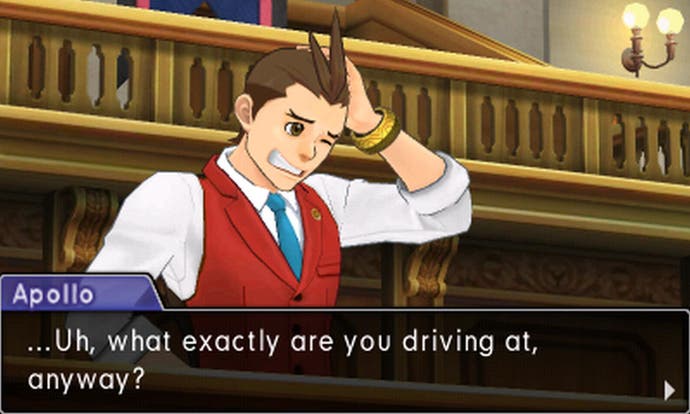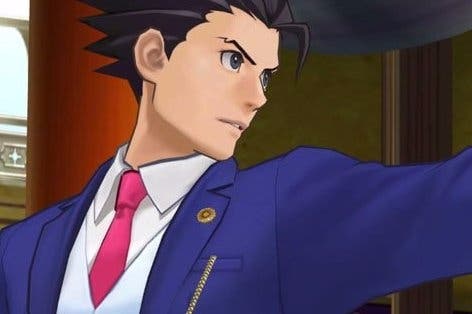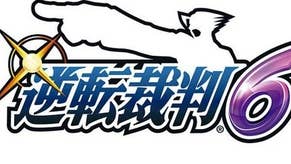Phoenix Wright: Ace Attorney - Spirit of Justice review
Maya have your attention, please.
All rise! The prosecution is ready, your honour, and I won't need long. Capcom's sixth main game in the Phoenix Wright series, Spirit of Justice, was released last week. It's an open and shut case, but only if you can get over the series' longstanding irritations.
Never played Phoenix Wright and don't know if you'll like it? Here's a good litmus test: if you like reading and find Pees'lubn Andistan'dhin an amusing name for a hippy, then congratulations. This latest batch of five murder mysteries starts with Phoenix travelling to the country of Khura'in, the home of his former assistant Maya Fey for a reunion almost a decade in the making. Khura'in is a deeply spiritual land about to boil over with its own problems, and while Phoenix embroils himself within a legal system that despises him, his protégés Apollo Justice and Athena Cykes risk life and limb with their own courtroom dramas at home.
The series' courtrooms are booming, raucous carnivals that veer closer to anime soap opera than Law & Order procedural. The crowd, more than ever, is a hostile, jeering presence, constantly braying for a guilty verdict (and accompanying death penalty) of characters most commonly framed for murders they didn't commit. Prosecutors are imbued with spiritual zeal, claiming to be able to see the outcome of trials before they've even happened. And then there re our heroes, the defence attorneys - shoulders hunched, visibly sweating, bluffing their way to a piece of critical evidence they need to present to the judge right now. These legal battles are noisy, hard-fought affairs, each slippery case twisting through its outlandish plotline while characters slam benches, point fingers and throw accusations in front of a bewildered judge.
Much of the drama comes from those on the docket, too, and here Spirit of Justice does a better job than some of the series' recent entries. There's lots of satisfaction in the gradual unmasking of its villains, added gusto in defending the characters wrongly accused, and each earned gotcha layers together to create this encouraging whole, all of which is complemented by a noticeable technical improvement in the game's animations. With the exception of the game's plodding fourth case, I found myself rooting for the heroes and seeking to undo the villains with a lot more emotional charge than I could muster for any of the series' recent adventures.

The thrust of each case takes place in the courtroom, but your time is also often spent investigating crime scenes - piecing together the court record you'll unfold at trial, presenting contradictions while cross-examining the prosecution's witnesses. Each character comes with their own additional gimmicks, such as Athena's mood analysing computer, Apollo's tic-sensing bracelet and Phoenix's ability to break open mental locks with his mystical (can we just say magic?) magatama. I know, and yes, it's all somehow a lot less preposterous when you're playing, I promise.
The prosecution now has a gimmick of their own, though, and the game's Khura'in chapters introduce the divination séance - a spiritual ritual which conjures up the last moments of a victim's life in glorious technicolour, alongside accompanying sensory experiences. Unlike the other gimmicks, which pop out every now and then and only when the game deems it necessary to advance the plot, the séance is a blend of evidence and testimony, requiring the player to spot the inevitable inconsistencies - such as a sound which shouldn't be audible - as if it were a witness on the stand, and is baked narratively into the legal system of Khura'in. By the end of the game, these have become a fundamental and meaningful part of the process.
Still, this is a series which has suffered from the same frustrations since the beginning. It's still too easy to fall victim to discord, aimlessly searching for the only right bit of evidence to present - the single key which fits the game's occasionally loopy logic, often when there's multiple instances where more bits of evidence would surely work.
One puzzle, for instance, will penalise you for offering up something that's immediately referenced upon presenting another piece of evidence - despite both fitting the narrative which then unfolds. The game's system of penalties still add an arbitrary 'lives' mechanic, which once again only serving to trigger a chain of annoying restarts-and-reloads when you're hopelessly bamboozled. It's hard not to come out of the experience and view the game more abstractly when this happens, and Spirit of Justice is far less enticing when it's a series of locked narrative doors rather than a tensely unfolding legal-themed pantomime.

There's the rub - for all its annoyances, Phoenix Wright always makes for such a successful visual novel because, when it's good, it's supremely exciting. You'll hit moments when you're in your flow, batting down unscrupulous characters across multiple cross-examinations, dropping the right bits of evidence - Take That! - and savouring each new line of the game's sharp dialogue while the music ratchets up excitedly in the background, totally ignoring the barista in Starbucks as they try to ask you if you're done with your coffee. Like all good novels, this is a game that severely consumes commutes and dramatically reduces time spent sleeping.
I also think it's a real shame Apollo and Phoenix, the latter now 35 and surely regarded as a master lawyer, both behave in such similar ways during their cases - you'd have a hard time differentiating their internal monologues. Surely it's time for Phoenix to act with a little more seniority and poise in the courtroom? I appreciate the game alleviates this somehow by casting him largely as a fish out of water in a new territory with its own rules and traditions, yet it still feels like we're yet to see Wright fully develop into the character the narrative presents him as.
Maybe that's a problem, too. This is a charming, engaging narrative, but Capcom play it wholly safe when it comes to its well-worn structures. Ever since Trials and Tribulations, the high-point of the series, it feels like each game has sought a little too hard to recreate its backbone wholesale. While I would argue Spirit of Justice is easily the closest Capcom has come to recapturing the magic of the original three games, as someone who's been following Phoenix for over a decade I would dearly love to see the team attempt to do something a little more adventurous next time around. Though not another Ace Attorney Investigations, thanks.
But Phoenix Wright is more novel than video game, and as such the game succeeds based on the quality of its writing - its whimsy, drama and dialogue existing as disciples to the ultimate triumph of whether it can pull off the most fundamental of narrative tricks: a solid and captivating beginning, middle and end. I wouldn't dare spoil the specifics but, thankfully, in this most crucial of areas, there can be no objections.










